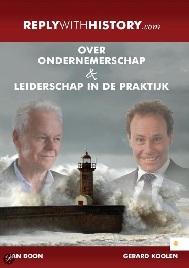105. Leader-Leader

Hi Gerard,
You mention good execution as one of the reasons for improved productivity amongst your colleagues. It is interesting that you mention this, as the best book I’ve read recently addresses this topic. The book was written by a submarine captain, David Marquet, who took over the worst performing ship on the US fleet. He turned it into the best performing ship and wrote a book about his experience ‘Turn the Ship Around’.
The main theme is that you need to change colleagues who ‘follow the leader’ for people who can make their own decisions. This is accomplished by having the people who have the most knowledge about a subject take the decisions. This is achieved by good training to increase the knowledge and clarity in the organizational structure and the most important thing that follows is responsibility and decision-making by those who have the most knowledge.
This is a good idea for any business if you have many specialists, who can make decisions on issues that they know more about than the boss. I feel that this is happening to us, there are more and more young people who are becoming ever more knowledgeable, so it’s effective to delegate to them. This works better than the ‘boss always has to come up with the idea’ model, where the boss decides on all details, takes the decision, and then has to explaining to staff why decisions were taken, for example, why new software was purchased. As I am sure you know, the result is resistance, particularly if the old program still worked fine.
A few years ago, we had a meeting with the back-and-mid front office on the export of securities transactions. At one point, the two youngest staff at the table addressed the meeting and the others (including me) just listened because we could not improve on the discussion. And I enjoyed every second, I thought it was fantastic that the two youngsters knew more in detail than I did and proposed well thought out solutions. This is ideal for business and much better than everyone sitting and waiting for the ‘boss’ mode. I always say that ‘only dogs have a boss’, whereas staff have an economic contract with an employer. Yet, it is difficult for people who grew up in the fifties and sixties to adjust to this Authority used to be revered and took all the decisions. And if the boss didn’t move, no one moved. It was as if everyone was in a train and the boss was the driver. And if the boss did not know or had no energy, the train stopped and you got out somewhere.
That is why I found this book so fantastic. And maybe this connection with the younger generation also has a lot to do with the internet. Indeed, there is so much knowledge freely available on the net. In the past, knowledge could not be spread so easily and the phrase ‘knowledge is power’ belongs to an earlier time. Knowledge is now free and up for grabs and is no longer just reserved for management.
The future no longer belongs to leaders and companies that give directives, but rather to companies that facilitate. They will need to facilitate to those within the company who build knowledge and entrust them with decision-making.
Best regards,
Erik












Leave a Reply